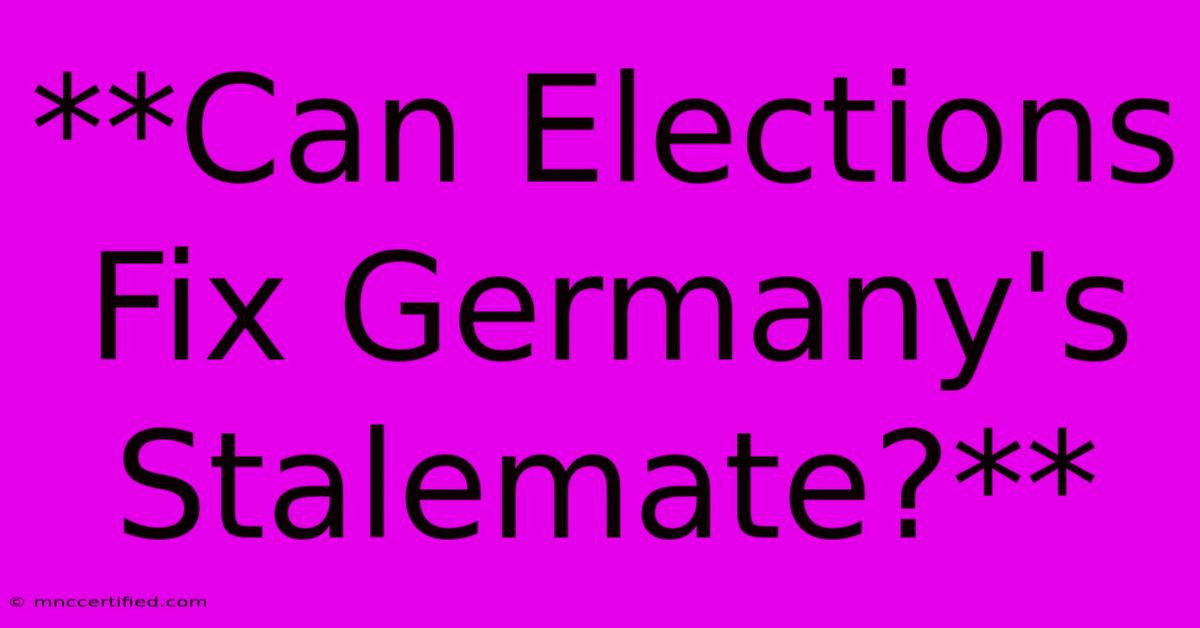**Can Elections Fix Germany's Stalemate?**

Table of Contents
Can Elections Fix Germany's Stalemate?
Germany, a nation known for its stability and economic prowess, finds itself at a crossroads. The recent political landscape has been marked by deadlock and gridlock, leaving many questioning if elections are the answer to Germany's current stalemate. This article delves into the challenges facing Germany's political system, explores the potential impact of elections, and analyzes whether they can truly be a catalyst for change.
The Roots of Germany's Political Stalemate
Germany's current political landscape is characterized by a fragmented parliament, making it challenging to form stable governing coalitions. Several factors contribute to this stalemate:
- Rise of Populist Parties: The rise of populist parties like the AfD (Alternative for Germany) has further fragmented the political spectrum, making it harder for traditional parties to secure a majority.
- Decline of Grand Coalitions: The traditional grand coalition between the CDU/CSU and SPD, which dominated German politics for decades, has lost its appeal, leading to a search for new political alliances.
- Policy Gridlock: The complex nature of coalition negotiations often results in policy gridlock, hindering crucial reforms and progress on pressing issues.
Can Elections Offer a Solution?
While elections are often touted as a democratic solution to political deadlock, their efficacy in resolving Germany's current situation is debatable. Here's why:
- Limited Impact on Fragmented Parliament: Elections may not necessarily alter the existing political landscape significantly, especially if the electorate remains divided and no single party achieves a clear majority.
- Potential for Continued Gridlock: Even if new coalitions emerge, the complex negotiations and potential for compromise among diverse parties could continue to result in policy gridlock.
- Need for Deeper Reforms: Addressing Germany's political stalemate may require more than just elections. Fundamental reforms to the electoral system, such as introducing a system of proportional representation with thresholds, could encourage greater stability and reduce fragmentation.
Beyond Elections: Finding Solutions
While elections may offer a temporary respite, they are not a guaranteed solution to Germany's political stalemate. Addressing the underlying issues requires a multifaceted approach:
- Strengthening Traditional Parties: Traditional parties need to re-engage with the electorate and offer compelling policy platforms that resonate with the concerns of voters.
- Enhancing Dialogue and Compromise: Fostering a culture of dialogue and compromise within parliament is crucial for overcoming gridlock and finding common ground.
- Reforms to the Electoral System: Exploring reforms to the electoral system, such as introducing thresholds or mandatory coalition negotiations, could enhance stability and facilitate government formation.
Conclusion: A Complex Challenge
Germany's political stalemate presents a complex challenge that cannot be solely addressed by elections. Addressing the underlying issues, such as political fragmentation, policy gridlock, and the rise of populism, requires a comprehensive approach that involves strengthening traditional parties, fostering dialogue and compromise, and potentially exploring reforms to the electoral system. Only by tackling these challenges can Germany find a path towards stability and progress.

Thank you for visiting our website wich cover about **Can Elections Fix Germany's Stalemate?**. We hope the information provided has been useful to you. Feel free to contact us if you have any questions or need further assistance. See you next time and dont miss to bookmark.
Featured Posts
-
Great Lakes Independent Insurance Agency
Nov 08, 2024
-
When Is Starbucks Red Cup Day This Year
Nov 08, 2024
-
M6 Reopens After Fatal Lorry Crash
Nov 08, 2024
-
Found Wedding Ring After Insurance Claim
Nov 08, 2024
-
Private Flood Insurance Lloyds Of London
Nov 08, 2024